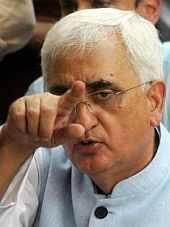 India on Thursday said its amendments to make the United States-sponsored resolution against Sri Lanka in United Nations Human Rights Council tougher could not be incorporated for lack of consensus among member-countries.
India on Thursday said its amendments to make the United States-sponsored resolution against Sri Lanka in United Nations Human Rights Council tougher could not be incorporated for lack of consensus among member-countries.
"Our amendments put explicitly what we implied in the resolution but it could have been put in the resolution provided there was a consensus," External Affairs Minister Salman Khurshid said.
"They wanted the largest number of members to support the resolution. We didn't want to break the consensus, we didn't want to be the spoilers and put in a question mark over what are our true intentions," he said.
The external affairs minister said the amendments put forth by India could be tried in separate attempts later.
"The amendments were essentially sent for the purpose of strengthening the resolution and bringing in satisfaction of the international community. I don't know how much the United States was in a position then to be able to consult everyone but this would not be possible and it could be tried after sometime in terms of separate attempts," he told reporters.
The minister said separate attempts to incorporate the amendments would have "destroyed the consensus and that India was more interested in passage of the resolution.
The UN Human Rights Council at a meeting in Geneva today adopted a US-sponsored resolution on alleged human rights violation in Sri Lanka with 25 countries, including India, voting in favour of the document in the 47-nation strong body.
The US-sponsored resolution asked Sri Lanka to conduct an "independent and credible" probe into allegations of human rights violations, an issue on which the Dravida Munnetra Kazhagam pulled out of the ruling United Progressive Alliance.
Khurshid said India would have been happy had the amendments to the resolution proposed by India were accepted.
"I think if those statements would've been included, of course, we would have been happy. These are very strong statements. It has come on record. And in our explanation, this is the job that we wanted to do," Khurshid said.
"India wanted accountability for no other reason but in order to allow sustainable peace to prevail in Sri Lanka and that the Tamil population of Sri Lanka must get their due," he said.
He said India had made a very carefully worded statement and "what we have said is that it has to be an independent and credible that is also be acceptable to the international community".
Answering why India's amendments to the resolution were not accepted, he said, "You know how it happens in the US. You make a suggestion that please take on-board the following amendments. And if that's possible by immediate consultations, it's done, if not it's too late, we can't now bring this in because this will destroy the consensus structure that we have developed."
Asserting that India's ties with Sri Lanka will not be influenced by the move that it has made in the resolution taken up by the UNHRC, the minister said, "India is active bilaterally with Sri Lanka."
"We continue to engage them bilaterally and we hope that our engagement is going to be beneficial for them and will address the aspirations of the people in India, including the Tamils in India," he said.








